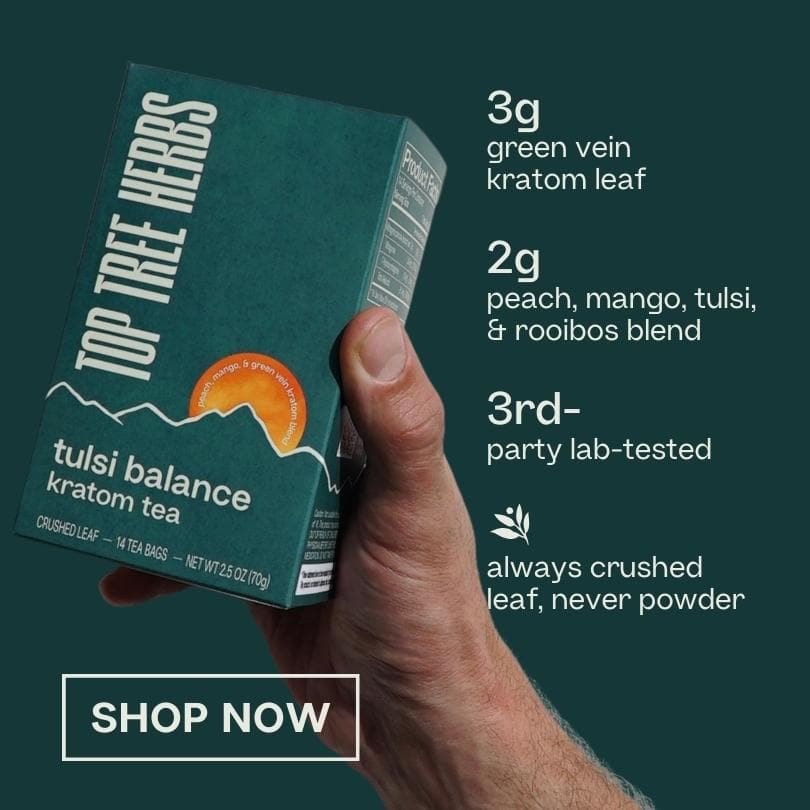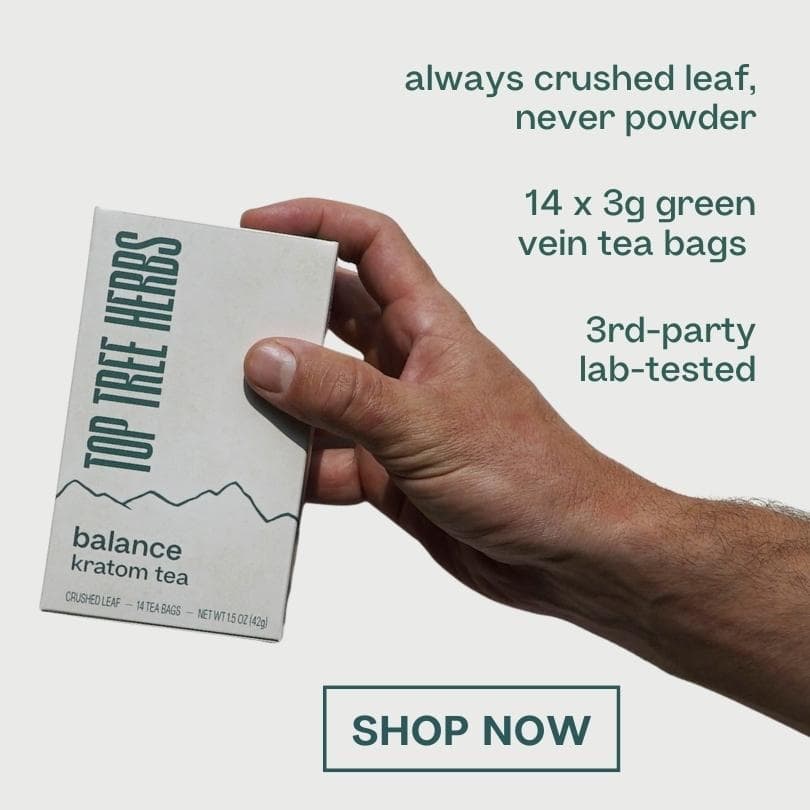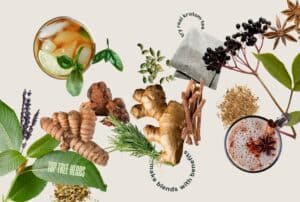Meet Tulsi Mango Kratom Tea!
Think you’ve cracked the code to brewing the best tulsi tea? Or have finally perfected the art of kratom tea? Well, we have some good news. If you’ve never combined tulsi tea with kratom tea, you’ve not reached your peak yet!
These two herbs have been used traditionally for hundreds to thousands of years, and both have roots in Southeast Asia. Today, they are remarkably popular adaptogens and wellness tea herbs. In this post we’re going to get into what makes these two herbs so special.
After the basics, we’ll move to main topic for today: explaining why kratom and tulsi are best when brewed together into a delicious adaptogenic sleepytime tea! The goal is helping you make a perfect herbal tea for sleep, so let’s get started!

What Is Kratom?
Kratom is what we’re all about at Top Tree Herbs. It’s a traditional tea leaf from Southeast Asia, with its center of cultural use in Thailand. It’s harvested from kratom trees (Mitragyna speciosa), which grow from the base of the Himalayas through the Pacific Islands.
Kratom is traditionally consumed in one of two ways. First, laborers working in fields and plantations will often pick and chew kratom leaves from trees as they work.
It is chewed for the energizing effect, and the belief that it helps them remain productive despite the beating sun, high humidity, heat, and exhaustion.
The second traditional method of consuming kratom is as a tea leaf. Several leaves are plucked and added to a pot of boiling water, and are left to steep in the simmering water for two to three hours. This tea, which is considerably stronger than the chewed leaf, is then doled out among the workers, or enjoyed later for a chill and sociable night.
And because kratom’s effect shift from energy to relaxation the more you consume, sometimes the strong kratom tea is used before bed with the intention of unwinding. The possibilities of kratom tea cover all ends of the energy spectrum.
Our goal is bringing this traditional practice to the US, which is why we offer a variety of crushed leaf kratom tea bags. In tea bag form, traditional kratom tea meets modern conveniences. Instead of requiring a three-hour brew time, a kratom tea bag, with a spritz of an acidic fruit like lemon, brewed in a thermos, is ready to drink in only 20 minutes!
What Is Tulsi Tea, or Holy Basil?
Holy Basil or Tulsi (Ocimum sanctum,) is a plant revered for its therapeutic potential. One of the most widely used ayurvedic herbs, tulsi is believed to have grown from one of Krishna’s lovers. It is closely related to “common basil” and is a widely employed cooking herb as well as ayurvedic object. It is so revered in India, that it is frequently cultivated outside temples, and even used on occasion to swear oaths on in court! (Voogelbreinder, Garden of Eden, Ocimum)
The chemical composition of Holy Basil consists of eugenol and other minor essential oils. Of these, eugenol has the most evidence supporting its activity. Animal models hint that eugenol may have antioxidant, anti-inflammatory, ache-relieving, and other wellness effects.
Topically, the eugenol in Tulsi can complement antifungal and antimicrobial actions. It also serves as a fantastic insect repellent. These wellness effects have long been understood by ayurvedic practitioners. But the traditional explanation for the effect differs from the one we have today.
For example, instead of attributing the healing properties to Vishnu and Krishna, the effects are now pronounced as stemming from it inhibiting lipid oxidation and modulating the NMDA receptor, among other explanations. Yet, incredibly, despite using mythological explanations, many of the functional applications of tulsi tea were established millennia ago!

Does Holy Basil Have Spiritual Benefits?
There is much debate over whether traditional medicine practices should be given any credence today. In fact, federal regulators in the United States prohibit vendors of traditional herbs from making medical claims based on traditional therapeutic practices.
Only rigorous clinical trials are allowed as evidence for medical claims. Despite the suppressing force this puts on discussion regarding traditional herbs, this, ultimately, helps prevent unscrupulous actors from making “snake-oil” claims.
Anything that can be done to prevent people from falling into scams is good. At the same time, we can use traditional practices as a guide for what we should study today.
In Hinduism spirituality, Holy Basil is revered. It is used to represent Lakshmi, the goddess of luck and good fortune, and as such is a common household garnish. It is believed to convey good luck and longevity if planted around temples, the house, and worn around the neck. With such a strong claim pertaining to the effects of tulsi, there is no wonder that it is spiritually important. But how do these claims stand up today?
The phenomenon of longevity and “good luck” relating to wearing tulsi is the same today, but simply wears a different explanation. We no longer explain the longevity benefits of tulsi to the good will of Lakshmi or Vishnu, but instead explain it as being a potent insect repellent.
Mosquitos, particularly, are repelled by the scent of eugenol. And considering mosquitos are known to carry and spread disease and illness, it’s easy to see how hoarding holy basil near a house or temple could be associated with longevity.
Does Tulsi Tea Have Vitamins?
One of the best, and yet most often overlooked, elements of herbal teas are the vitamins and minerals. Plants, much like us, require these essential components to function. And when we decoct beverages from them, they impart these valuable nutrients to us.
With multivitamins looking more and more ineffective, it’s essential to begin looking elsewhere for our micronutrient needs. We know that tea is great for our health, so we asked ourselves: “does tea have vitamins?”
For starters, Holy Basil is a nutritional powerhouse. Tulsi leaves are known to contain vitamins A, C and K and minerals like calcium, magnesium, phosphorus, iron and potassium. Really, this is just confirmation of the thousands of years of use it has enjoyed as a plant for general health. In short, it’s long been considered an adaptogen, and this is just beginning to validate it.
Kratom, unfortunately, has not been studied for its nutritional properties. But there are basic tenets of plant science that can hint at the nutritional properties of kratom leaf. Leaves contain an abundance of a single polypeptide complex: RUBISCO (ribulose 1,5-bisphosphate carboxylase/oxygenase). This complex protein usually contains eight of the nine essential amino acids we require.
It is the fault of our current understanding of medicine that we so often reduce health to taking a specific compound for an illness. Health should always be thought of holistically, and while compounds do work for certain illnesses, having a well-rounded and nutritious diet is crucial in being truly healthy.
Drinking Tulsi Kratom tea not only provides the wellness benefits of the essential oils and alkaloids in the leaves, but also conveys nutritional benefits as well!

How to Potentiate Kratom?
Everyone wants to know how to get the most bang for their buck. So, when it comes to kratom tea, it’s no different. We’ve written about how drinking kratom tea after having grapefruit juice can potentiate the effects you feel. Balance
But is there a way to potentiate your kratom tea without it necessarily being stronger? Our first idea that kratom may be potentiated by holy basil came from looking through a couple of Reddit threads where users reported stronger effects when consumed together.
We dug into it a little further, and noticed that eugenol has some slight relaxing effects by itself. While this could explain some of the potentiating effects, we kept digging deeper.
Without strong evidence for any enzymatic relationships that could explain the potentiation, we couldn’t pin it on that. To us, the potentiation that comes from mixing tulsi with kratom likely comes from the holistic health elements we discussed above.
Rather than trying to bolster your wellness routine with just one herb, in this case kratom, to see specific effects, such as feeling energized or chilled, let’s consider the potential benefits of herbal blends. Since Tulsi tea is so high in nutrients, vitamins, and minerals, we suspect that the wellness boost that tulsi brings simply makes the job of kratom a whole lot easier.
Without coming to any hard and fast conclusions, however, all we can say is that we are extremely excited to share our herbal blend featuring kratom and holy basil. Plus, it’s peachy flavor is truly exceptional.
Even if there turns out to be no mechanistic cause for the felt potentiation of kratom by tulsi, the way the flavors blend together is justification enough. Mmm, yum!
Why We Made Holy Peach: Tulsi Mango Kratom Blend
Combining adaptogens is smart. That’s why we made it easy to do just that with our herbal tea blend. Tulsi tea and kratom tea have a combined tradition of use of over 5000 years! Honestly, we’re amazed that no one has blended them together before us. We’re thrilled that our favorite way to combine adaptogens is finally available for you to try as well!
We added rooibos to the blend as well for its classically sweet flavor. On top of that, we add natural mango and peach flavors to hide any remaining bitterness. You’ll be impressed by the color and the spicy, annise, licorice like flavor. This really is one of our most unique kratom herbal blends yet.
Most herbal blends work to disguise or dampen the classic, earthy kratom flavor. This blend, however, does something completely different, and transforms it into a novel and unexpectedly pleasing taste.
In short, even though tulsi tea and kratom tea are great on their own, they’re even better together. So, give this special kratom tulsi tea blend a shot! You never knew combining adaptogens could be so delicious!
![[Not Used Yet] Tulsi blog graphic [Not Used Yet] Tulsi blog graphic](https://toptreeherbs.com/wp-content/uploads/elementor/thumbs/Not-Used-Yet-Tulsi-blog-graphic-psnkv5p0dgdhvmnbnhyx3ic7k39wyp1g0oipq2p5y6.png)




